A media war has begun against the editor of Infodio and against third parties associated with this writer and his investigations. Before diving into the topic, let’s revisit the discussion of the society of accomplices. In Venezuela, neither the oversight bodies, the judiciary, the people’s defender, nor the police, nor regulatory agencies serve their purpose. We all sink together if civil society does not act as the last barrier against the social acceptance of corruption. That’s why I have written about the values formation of the bolichicos, and at the end of this piece, you can read my insights on the controversy sparked by the criticism of the Cumbres Institute.
Several people have reacted to my piece about the society of accomplices, mentioning that there is indeed a group of Venezuelans who have long been opposing this society of accomplices as they should: denouncing it, not being part of that social acquiescence, and keeping their distance. I have received information from various sources, and though the protagonists did not want to speak with Infodio, what I’m about to recount I know for certain through the validation of details.
Are you curious to know how that monumental legal mess of $300 million between the bolichicos Derwick and the García Velutinis of the Banco Venezolano de Crédito began? It starts with the issue of the society of accomplices. At its core is the courage of some to want to live by standards in a society that views standards and principles as a nuisance or as orthodox or stubborn. Very few people are willing to voice public opinions when someone crosses the line—let alone put them in writing and distribute them.
A part of the problem with Venezuelan whistleblowers is that they accuse everyone of all kinds of things and hold people accountable while spreading gossip without certainty and without distinction. Likewise, people read something somewhere and assume that a complaint, no matter how unfounded, must be true. Folks, just because something is written doesn’t make it true. What makes Infodio a website worth reading (and copycats everywhere) is that the information is truthful. While there can be differences in opinion, the facts on this website are not a matter of perspective. Therefore, the tremendous Alek Boyd is not afraid of litigation: because Boyd does not cross the line between technical and gossipy. And when it’s necessary to correct, that is done. Similarly, when serious people reject a rogue, that has an impact.
These few commentators I consider serious include the tenacious Pedro Mario Burelli (former director of PDVSA) when he publishes on his blog about the sins and miasmas of CAP’s apostles. Another important Venezuelan liberal intellectual is Carlos Blanco (former minister of COPRE), who writes unabashedly and with undeniable force. We cannot forget the champion of truth and the scoop: Nelson Bocaranda, who informs a nation when others remain silent and repeats the truths even if the regime’s media leadership refutes them a thousand times. We could also add Maruja Tarre and some others like Marianella Salazar, Gustavo Tovar, and Cesar Miguel Rondón. The point isn’t that they denounce corruption, but that they name people they know and with whom they share social relationships.
The Bolichicos/Garcia Velutini issue arises from various entanglements. For example, when Rafael Alfonzo made a comment about the bolichicos at a business group meeting. It turns out that the main bolichico, Leopoldo Alejandro Betancourt López, decided to create the Hermógenes López Foundation in mid-2012 to start cleaning up the image of rogues. The bolichico’s foundation—in stark contrast to the rich traditions of Fundación Polar, Fundación Neumann, Fundación Boulton, and industry titans like the Blohm, Vollmer, Mendoza, Branger, Hellmund, and Brillembourg—has vanity as its goal. Why should Alejandro Betancourt and his gang care about the future of little kids living in slums when they are robbing their ability to have electricity?
It turns out that the chief bolichico chose the name “Hermógenes López,” and Rafael Alfonzo was annoyed that the crooks from Derwick wanted to use the name of the former President López (the great-grandfather of Mrs. Alfonzo) for their social activities at the Country Club, to present themselves as magnanimous philanthropists and gift-givers. Alfonzo complained, and he did so loudly. A week hadn’t even passed, and the hacking team from Derwick Associates, led by Rafael “RaFa” Núñez, flooded the Internet, in hundreds of websites and search engines like Google, with the terms “Rafael Alfonzo” and “king of pedophiles” among many other vile falsehoods.
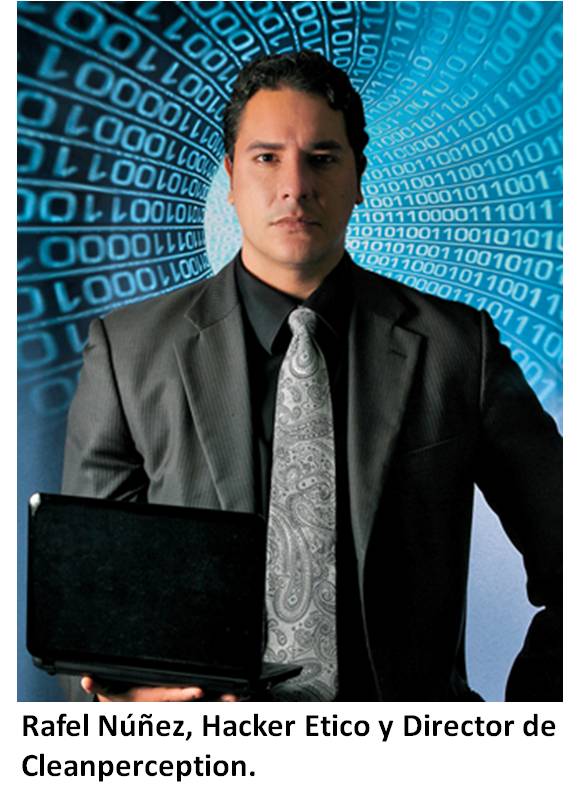
Rafael Núñez, hacker “RaFa” de Derwick, se dedica a limpiarle la reputación en línea a los bolichicos y a hackear y amedrentar a todo aquel que se aventure a criticarlos—incluyendo a la colectiva Infodio.
This astounding episode of baseness has even been the subject of an extensive investigation by a journalist in Chile (a former Bloomberg reporter and now with Monocle), Steven Bodzin, on his website. There, Bodzin attests to the fact that someone curiously cleaning up the online reputation of Nervis Villalobos, Domingo Guzmán López, Pedro Trebbau López, and Alejandro Betancourt López, among other bolichicos, is “RaFa” Núñez who also decided to tarnish the name of Rafael Alfonzo and anyone who speaks ill of Derwick.
The social acceptance issue of bolichicos in society is the most important goal of the Convit-Guruceaga-López mafia. Thus, the extravagance, the parties, the foundation—to “arrive” and be accepted, even when they don’t deserve so much as a greeting. Just as I wrote last week, the bolichicos created a support network within a group of students at the Cumbres Institute. And now, to the dismay of many, instead of straightening their children out, parents coddle and defend them.
When money and family ties no longer serve their purpose, what other tools do the bolichicos have left? Threatening and harassing.
There’s a young man who serves an administrative role at the Banco Venezolano de Crédito. This young man, like Oscar García, the president of that institution, has business conduct standards that would rival a convent’s superior. In other words, he is obstinate and a difficult person who prefers to eat alone rather than poorly accompanied. This young man and his wife declined invitations and advances from the bolichicos’ social circle. They even stated in their own social circle that nobody should invite the bolichicos to society weddings. What was the reaction? Within days, the wife’s Twitter account and Facebook page were hacked. This young couple was subjected to police surveillance, their emails and phones were intercepted, and then—unhappy with the harassment—the bolichicos Trebbau-López and Betancourt-López decided to sue the Banco de Venezuela and the young man who refused to shake their hand.
But this legal demand must be viewed in context with Alfonzo and García’s behavior. Individuals with a long list of enemies. Why? Because they have turned their backs on the rogues in the bank superintendency, in Fedecámaras, in social gatherings, and even on Sundays at mass. And thus, they call this duo “arrogant,” instead of what they are: people with principles. When will we in Venezuela turn our backs on the criminal elites, and then the country will change? If that doesn’t happen, we will remain forever stuck in corruption.
This website was recently linked to the Mezherane family. Then to former Mayor Leopoldo López and his cousin Thor Halvorssen. In the last two weeks, they have tried to link it with Oscar García. Let’s lay it all bare, folks. As the name of this site in Latin suggests, “Infodio.” Excavating.
Let’s bring to light what is buried.
Folks, let’s not deceive ourselves; let’s not deny the obvious. The fiercest guy in banking, whom even Chávez wanted to ruin but couldn’t, is Oscar García, former President of CEDICE, a banker who, unlike others, never accepted government royalties, making him independent from all government entities. Just as Marcel Granier and RCTV stood up to the media’s chavismo, García stood up to financial chavismo. Of course, the Banco Venezolano de Crédito is a midget compared to corrupt empires like Banesco, BOD, Corpbanca, and Banorte. But García has remained intact and invulnerable, which is why José Vicente Rangel, the so-called “leaders” of banking, and many others were furious. How dare García and Alfonzo behave this way and demand ethical conduct? Who do they think they are?
The bolichicos believed that if they destroyed Oscar García, nobody would dare to confront them in the future. Their lives are a mix between the show Entourage and The Firm, and they thought it was a masterful move that would make them untouchable. And so, with Rangel’s approval and the assistance of the insecure Victor Vargas Irasquin (a banker and financier of both the regime and the opposition), the bolichicos threw a colossal $300M lawsuit at García and Alfonzo. The matter ends up as a disastrous public relations nightmare, causing a storm that continues to this day with the complicated lawsuit involving Otto Reich and articles in hundreds of global newspapers.
The Derwick group remains convinced that García is behind my writings (and perhaps behind Reich), and they keep throwing media punches to punish him for what appears in Infodio. They are doing the same with Otto Reich.
With the creativity of incompetents who should have scraped through in university, the Derwick bolichicos only know how to use two tools: a website called Primicias24 and the old man José Vicente Rangel. And of course, the retweets from their hacker “RaFa.”
It took me a while to analyze this hypothesis, but it became reality when I spotted the comical antics of Primicias24. This website has been working on the reputation of bolichicos for some time. Check out these tweets from 2012 where Primicias24 gleefully reports that Derwick made a donation or attended a construction expo (what a scoop, right?):
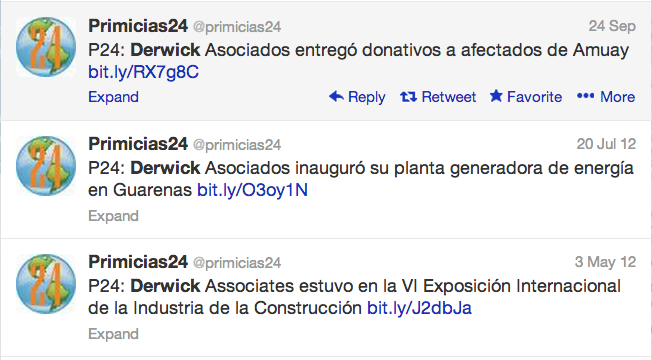
Every press release sent by Derwick appears on the Primicias24 site as a news piece. Where else does it appear? On sites owned by the hacker RaFa and nowhere else.
Imagine the coincidence that the same editor of the Primicias24 portal is the person, along with J.V. Rangel, who in 2012 made an accusation against the Venezuelan authorities regarding Oscar García, encouraging the government to imprison García. This during the legal dispute between Derwick and García. Look at these tweets from 2012:
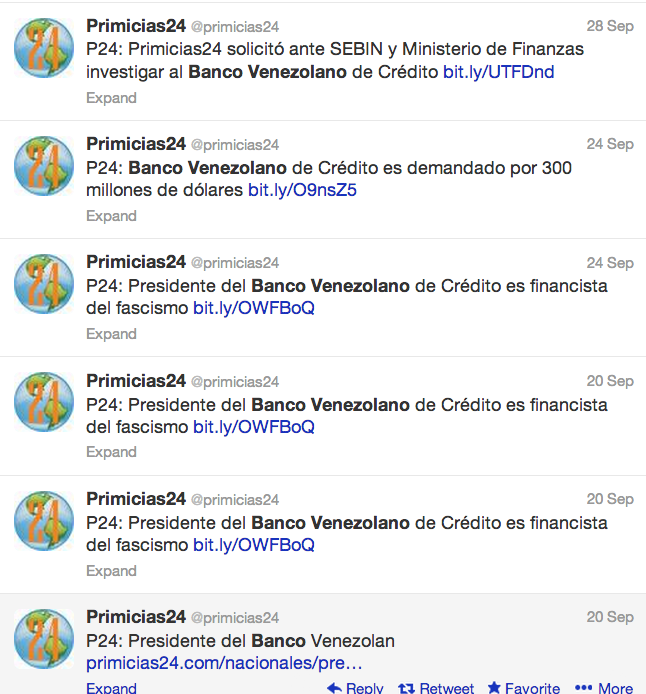
What a coincidence that twelve months from these tweets, suddenly, just two weeks ago, with an intensity that shakes, as I begin to write about the gang of criminals Convit-Guruceaga-Lopez, on a single day, September 12, 2013, Primicias24 published several attacks against García and dozens of tweets claiming he and others are murderers. (Look them up on Twitter; there are dozens and dozens of tweets).
The same tweet repeated again and again—something that Primicias24 only does with tweets against García. This happens on the 12th, 13th, 20th, 23rd, 25th, 26th, and 28th of September and even yesterday dozens of tweets attacking García. Here are some examples:

Just a few days ago, the latest absurdity from the bolichicos through Carlos Herrera and Primicias24 is an article titled: “Alek Boyd has AIDS” in English and Spanish, where they paint Alek as a sick man wanting to infect others with a deadly illness he supposedly contracted, according to the bolichico reporter, on Avenida Libertador from a transsexual. What is achieved by publishing such madness? The bolichicos are in despair. Society has awakened to what they have done. There is discontent. Meanwhile, the government will not be able to cover this issue forever.
And all the good people in my neighborhood, the Country, must choose between their lifelong family friendships and remaining in the society of accomplices, or rejecting the behaviors of the bolichicos.
And at this very moment, on the front page of Primicias24, there is an advertisement (not even an article) claiming that García finances murder. At these levels, the bolichicos and their team have descended. Look at the photo:
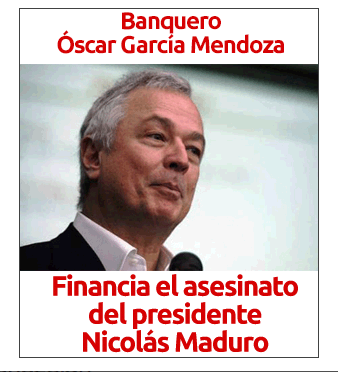
Oscar García Mendoza en Primicias24
Interestingly, the articles against García claim he employs “lowly journalists.” This is undoubtedly an indirect attack on my writings. I feel, frankly, like a champion. On one hand, Derwick places their ads on Primicias24 while on the other hand, the same portal attacks García for being my supposed godfather, and accuses the editor of Infodio of being a murderous AIDS patient. What a transparent thing. What slow-witted bolichicos.
The problem is that they don’t understand that in life not everything has a price. The truth cannot be bought. Neither Alek nor I are for sale; nobody pays us to write. We do it because it’s the right thing, because we are tired and want to raise our voices against all the scum that have ruined our country. Meanwhile, they pay shoddy PR people (like the backfire that the piece Hilary Kramer wrote in Forbes turned out to be).
Even with financial muscle, the only thing the bolichicos can achieve is a third-rate lackey who publishes such ridiculous accusations that it’s laughable. But let’s not forget the other secret and original weapon of the electrical bolichicos: José Vicente Rangel. Rangel is the one who goes on TV, as is customary, to make his accusations of murder or destabilization. Two Sundays ago, to be even more obvious, guess who JVR targeted? Alek Boyd and Oscar García.
What’s sad is that one of the bolichicos, Francisco Convit, despite having such an illustrious grandfather, did not inherit enough common sense to see how irrational it is to suppose that associating with José Vicente Rangel will make him and his partners seem more honest. Consider the irony that these kids from Lagunita and Country Club have Carlos Herrera and the old man José Vicente as their aides.
I feel somewhat uncomfortable that my writings may affect García, Alfonzo, and anyone they try to associate with me, but I think what happened with Primicias24 should not bother them given how absurd this mix of fictions is, and how obvious it is to prove that the bolichicos are behind all of this.
To Bocaranda, García, Alfonzo, Burelli, Tarre, Rondon, Blanco, and Tovar, if you happen to read these lines, I send my respect from this platform for your principles, integrity, and dedication. And to the thieving bolichicos, I wish more creativity, as what’s coming for them seems to be tough.
NECESSARY CORRECTIONS
The piece about the Cumbres Institute has produced a very dynamic reaction. Several of you have written to say I messed up.
First correction: Luis Oberto was part of the second graduating class of Cumbres. According to various alumni who wrote (to [email protected]) from Cumbres, Oberto went to UCAB where he was involved in not one but two fraud scandals (one when he bought an exam and another when he was caught cheating on a test). It turns out that the old Oberto hired the gem Carlos Escarrá to sue UCAB so that the cheating Oberto could obtain his law degree. I regret not including the detail that this exemplary lawyer indeed graduated from Cumbres.
Second Correction: Among the many emails we received at Infodio is one that perfectly captures the controversy we sparked with the criticism of the Cumbres Institute. A reprimand of the institution perceived as unwarranted, resentful, and even malicious.
“I have always categorically rejected these characters and all those who, in one way or another, have stolen and embezzled my country. But I want to be very clear; I do not agree at all with your generalization saying that ‘Instituto Cumbres: the breeding ground of delinquents that generated bolichicos, dirty bankers, and plugged-in.’ I feel insulted by this article, as do many people I know, with whom I studied, and who have shared a life in which we have done nothing but work and seek excellence without robbing anyone. […] I have no interest in being friends with thieves. I have always lived and will live maintaining the integrity of a education that in my case, comes from my home and from school, where I spent the majority of my early years. […] I am sure that if you investigate the people who have studied at Cumbres, besides this bunch of scoundrels that embarrass me, there are professionals, athletes, musicians, and artists whose accomplishments are much more significant than the misdeeds of these people. […] I find the work both you and Alek are doing memorable, and I congratulate you on all your articles, except the one today.”
Folks, let’s be very clear that when I write about the breeding ground of delinquents, I also say that the priests of Cumbres are good people with values; I reiterate my admiration for Fathers Bernard, Jaime, and Ramiro. However, one must ask how it is possible that a school dedicated to forming the elite has produced students of the caliber of Luis Oberto and Alejandro Betancourt. More than a dozen. All in different classes, all partners, all scum who bleed Venezuela dry. This is not a coincidence. Something is going on here.
Obviously, my rejection is, like many who write asking for correction, aimed at the behavior of the delinquents. Undoubtedly, the Cumbres Institute and the Legionaries of Christ (since its founding in Mexico by Father Marcial Maciel in 1941) have had undeniable successes and extraordinary students. However, the institution must be strong enough to tolerate criticism when such billion-dollar outrages occur. We know their parents failed them (just look at the Arismendi household defending them), but what about the school?
On the other hand, let’s make it very clear that today’s Venezuelan has two options: either we reject and distance ourselves from the corrupt or we become members of the society of accomplices.
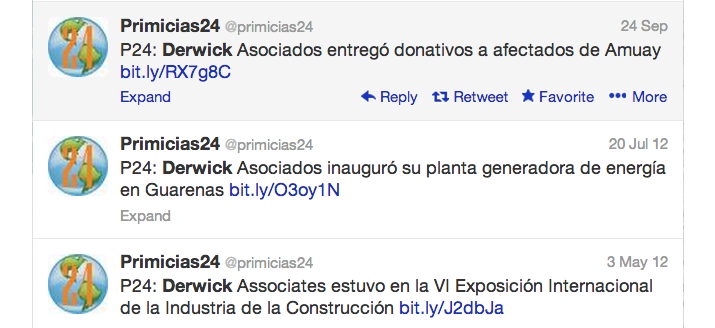
Tomás Lander